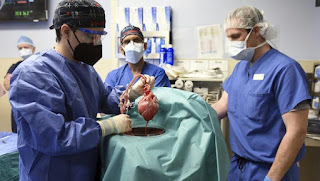For the first time in medical history, a patient at a Maryland hospital, United States (US) received a pig heart in the latest attempt at a heart transplant. The process was a success, and the patient was in stable condition three days after the procedure.
David Bennett, the 57-year-old man who underwent the transplant said the day before the operation, that he gave up the transplant was like shooting in the dark.
Xenotransplant?
"The choice is between dying or trying to have this transplant. I want to live. I know this is like shooting in the dark, but it's my last option," he said as quoted by Newsweek, Wednesday (12/1/2022).
The procedure, known in medical terms as a xenotransplant, has been approved by the U.S. Food and Drug Administration (FDA) and is classified as an emergency use authorization.
Bennett's son said his father already knew that there was no guarantee the experiment would work. However he was not eligible for a human heart transplant so he had no other choice.
Doctor's opinion
While it's too early to say whether the transplant will actually work, this high-level experimental operation could be a medical breakthrough, as doctors at the University of Maryland Medical Center say it demonstrates the possibility of genetically modified animal organs functioning in the human body.
The pig's heart has been genetically modified to remove the sugar content that often rejects organs quickly in its cells.
Dr Muhammad Mohiuddin, scientific director of the animal-to-human transplant program at the University of Maryland Medical Center, suggests this procedure could be a solution to the organ donor crisis.
"If this is successful, there will be an endless supply of similar organs for suffering patients," said Dr Mohiuddin.
He said organ donations in the US are very few, while the list of patients in need of transplants continues to grow. This condition prompted doctors and scientists to turn to animal organs to fulfill it.
According to the United Network for Organ Sharing (UNOS), there will be more than 3,800 heart transplants in the US in 2021. This figure is a record high.
This isn't the first time doctors and scientists have attempted animal-to-human transplants. In 1984, a critically ill baby was able to prolong his life by 21 days with a baboon heart. And last year, researchers in New York, USA, discovered a temporary way to use pork kidneys in humans.
However, Karen Maschke, a researcher at the Hastings Center in New York, cautions that the data gathered from this new development will need to be shared and processed before anyone can open up options to more patients.
Still, the procedure is considered a medical history, and a very important first step towards expanding options for patients requiring organ transplants.


